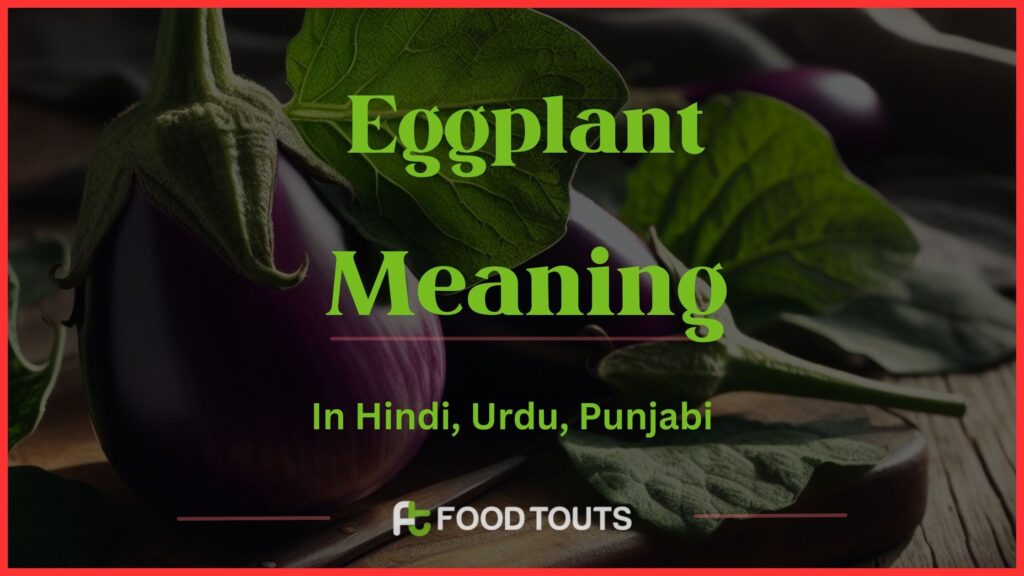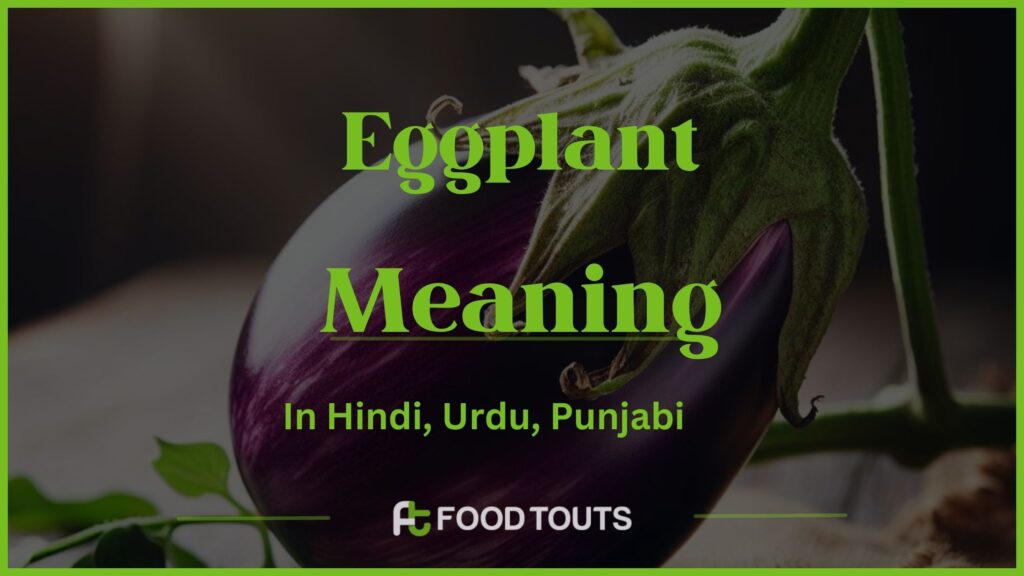Known as “aubergine” in British English, “brinjal” in South Asia, “berenjena” in Spanish, and “melanzana” in Italian, the eggplant boasts a wealth of aliases, reflecting its global presence and adaptability. Its ability to take on various flavors and culinary techniques has made it a cuisine staple. This versatile vegetable has the power to transform itself into a myriad of delectables In India, it takes center stage in curries and chutneys, while in China, it’s stir-fried to perfection. In every corner of the world, the eggplant has found its place on the plate, each time telling a unique story through its preparation and presentation. Let’s learn more about Eggplant and its meaning in detail.
Eggplant Meaning in Hindi: “Baingan” (बैंगन)
The eggplant is known as “baingan.”(बैंगन) in India. This term is widely recognized and used in everyday conversation. The word “baingan” evokes a sense of comfort and familiarity, as it is a staple ingredient in many Indian dishes. From a smoky roasted eggplant curry to Baingan Ka Bhurta, a delicious mashed eggplant preparation, this vegetable plays a central role in Indian cuisine.
Eggplant Meaning in Urdu: “Baingan” (بینگن)
Urdu, a language closely related to Hindi, also uses the term “baingan” to refer to eggplant. This shows that people in the Indian subcontinent all love “baingan” even if they speak different languages. It proves that this vegetable is ubiquitous in the food of this area.
Eggplant Meaning in Punjabi: “Vangan” (ਵਾਂਗਣ)
In Punjabi, a language spoken predominantly in the northern Indian state of Punjab and parts of Pakistan, eggplant is referred to as “vangan” or “vengan”.
Don’t confuse it with vegan, that’s different.
Punjabi cuisine boasts a rich array of eggplant-based dishes, such as “Vangan Bhartha” and “Vangan Da Bhurta,” showcasing the vegetable’s prominence in the regional diet.
Eggplant Meaning in Persian (Farsi): “Bademjan” (بادمجان)
Moving further west to the Persian-speaking world, we encounter the term “bademjan.” In Persian cuisine, eggplants are a beloved ingredient, and “bademjan” is a common word used to describe this vegetable. The Persian culinary repertoire features dishes like “Kashk-e Bademjan,” a delectable eggplant and yogurt dip, showcasing the versatility and richness of eggplants in Persian cooking.
In all these languages, whether it’s Hindi, Urdu, Punjabi, or Persian, the word for eggplant reflects the vegetable’s integral role in the local cuisines. These languages capture not only the essence of the eggplant itself but also the deep-rooted cultural significance and love that people in these regions have for this versatile and delicious vegetable.
Eggplant Health Benefits

1. Rich in Nutrients
Eggplants are a good source of essential nutrients like fiber, vitamins, and minerals. They contain vitamins B1, B6, and K, as well as manganese, copper, folate, and potassium.
2. Low in Calories
Eggplants are low in calories, making them a suitable addition to a weight-conscious diet. A one-cup serving of cooked eggplant contains only about 20-25 calories.
3. High in Fiber
Eggplants are rich in dietary fiber, which aids in digestion, helps maintain healthy blood sugar levels, and supports heart health by reducing cholesterol levels.
4. Antioxidant Properties
Eggplants contain antioxidants like nasunin, which help protect cells from damage caused by free radicals. These antioxidants may contribute to reduced oxidative stress and a lower risk of chronic diseases.
5. Heart Health
The fiber, potassium, and antioxidants in eggplants can contribute to heart health. Fiber helps lower cholesterol levels, while potassium helps regulate blood pressure, reducing the risk of cardiovascular diseases.
6. Weight Management
Due to their low-calorie and high-fiber content, eggplants can help with weight management by promoting a feeling of fullness and reducing calorie intake.
7. Cancer Prevention
Some studies suggest that the compounds found in eggplants, such as phytonutrients and antioxidants, may have a protective effect against certain types of cancer.
8. Blood Sugar Control
Eggplants have a low glycemic index, which means they have a minimal impact on blood sugar levels. This can be beneficial for individuals with diabetes or those looking to maintain stable blood sugar levels.
9. Digestive Health
The dietary fiber in eggplants supports a healthy digestive system by preventing constipation and promoting regular bowel movements.
10. Bone Health
Eggplants contain small amounts of calcium and other minerals important for bone health, contributing to overall bone strength.
It’s important to note that the health benefits of eggplant are best obtained when it’s prepared in a healthy manner, such as grilling, roasting, or steaming, rather than deep frying. Additionally, individuals with certain health conditions, such as kidney problems, may need to limit their eggplant intake due to its oxalate content. As with any dietary changes, it’s advisable to consult with a healthcare professional or nutritionist to determine how eggplants fit into your specific dietary needs and health goals.
Cooking Variety and Serving Suggestions
Eggplant is known for its kitchen versatility, from roasting for a smoky flavor to grilling for a delightful char, frying to a golden crisp, or stewing for creaminess. Whether you’re savoring an Italian Caponata, a Greek Moussaka, or an Indian Baingan Masala, eggplant shines in diverse dishes. It offers endless options, like Mediterranean Eggplant Parmesan, Turkish Imam Bayildi, or simple Baingan Bharta. It can elevate sandwiches, wraps, and salads with its creamy, savory essence, enhanced with olive oil, herbs, and seasoning
In all these languages, whether it’s Hindi, Urdu, Punjabi, or Persian, the word for eggplant reflects the vegetable’s integral role in the local cuisines. These languages capture not only the essence of the eggplant itself but also the deep-rooted cultural significance and love that people in these regions have for this versatile and delicious vegetable.

